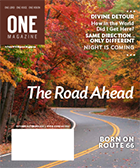
October-November 2015
The Road Ahead
------------------
|






Missions in the 21st Century
By Jeff Turnbough
Philip Jenkins, distinguished professor of history at Baylor University, has researched and written extensively about the historic growth of the Church, specifically focusing on trends in the past two centuries. One of his most helpful works is The Next Christendom: The Coming of Global Christianity. Jenkins gives statistical evidence that the heart of Christianity no longer resides in the West, but rather in the continents of South America, Africa, and East Asia. This is what he calls the Global South.
He paints a picture of current-day Christianity that is non-white and poor. This revelation should cause us to pause and reevaluate our perspective on worldwide Christianity. Combine that with Operation World’s Patrick Johnstone informing us that the Church in the United States is in decline (with the exception of some growth among minority ethnic groups), and perhaps we should rethink missions. Obviously, from a Kingdom perspective, we are concerned about understanding the current growth and expansion of Christianity, and how these facts inform our thinking and our work.
The new international director of OM (formerly Operation Mobilization), Lawrence Tong, is from the Global South. When he became OM’s director, OM’s international office moved from the UK to Singapore. In a recent initiative, Tong writes:
Globalization means that we should seek out new frontiers of mission, where millions live unnoticed by God’s people. These “least reached” are essential to the Kingdom of God. As a reflection of where the growth and energy of the Church is today, people from these regions deserve and expect a greater participation alongside Westerners, who will no longer have the dominant voice. My plea is that we all—West, South, East—leave our own tables and find a new, third roundtable where we sit as equal partners, making joint decisions about our future. Since we all have been called by the same Master to this greatest of tasks, in God’s eyes everyone’s ideas and concerns matter. It is everyone’s business.
Consequently, OM addressed this issue by creating what they refer to as the third table. In general, people from my culture tend to come to a meeting with a plan and voice ideas quickly. Brothers from other cultures have taught me that while they may be more reticent to share their perspectives quickly in a meeting dominated by leaders from the Global North, they do have relevant ideas or perspectives on the issues we are discussing. Many times, they feel out of place in our Western-style meetings.
OM’s proposal creates a space where leaders from the Global North and South sit as equal brothers to discuss the needs of the Church and the world outside the Church. The talkers intentionally wait to hear from those more reticent to speak. We all have things to learn from each other. As God’s people who long to see God’s Kingdom established on earth, we need one another.
Jesus proclaimed the world would know us by our love. In the 21st century, that means intentional, specific, and concrete measures to begin conversations with our brothers from around the world. We must gain and follow a global understanding as we work together to fulfill the Great Commission. Our challenge is to embrace the changes that have taken place in the global Church for the sake of the continuing expansion of the gospel of the Kingdom.
About the Writer: Jeff Turnbough has served as director of field operations for Free Will Baptist International Missions since 2008.
|
|

